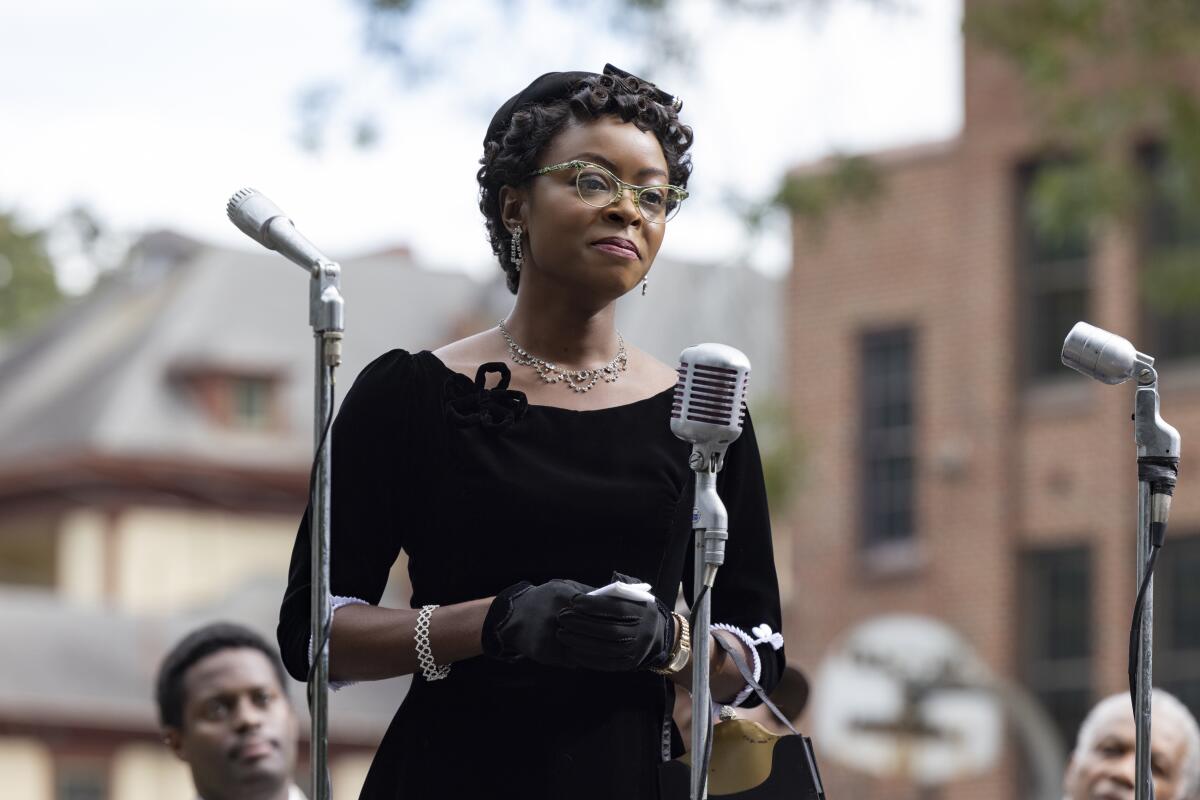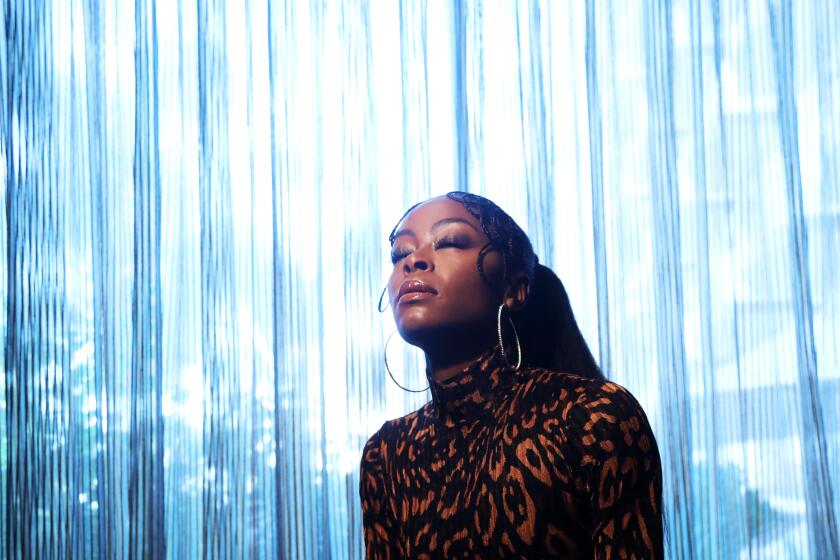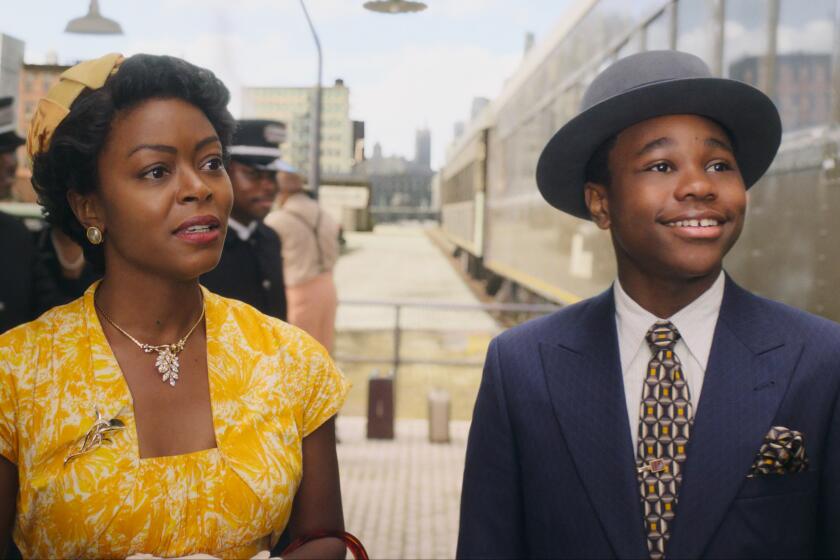How the tragic story in ‘Till’ chronicles the rise of an activist consciousness

- Share via
In her youth, filmmaker Chinonye Chukwu learned the story of Emmett Till, the 14-year-old Chicago boy who in 1955 was kidnapped and brutally murdered during a trip to Mississippi. But it took her longer to learn about Mamie Till-Mobley, Till’s mother, whose push to publish the photo of her son’s mutilated body in Jet magazine galvanized the public.
“I remember the photo of Mamie grieving,” Chukwu says, “but not the connection between what Mamie did and the civil rights movement.”
With her new film “Till,” Chukwu, whose previous film “Clemency” made her the first Black woman to win the U.S. Dramatic Grand Jury Prize at Sundance, has gotten Hollywood to finally turn its attention to Till-Mobley’s story.
Till-Mobley was clearly attuned to the power of visuals and wanted the story of her son’s lynching to be made into a feature film. “Mamie wanted this story told in the mid-’50s,” Chukwu says. But “the stories of Black women on-screen don’t tend to be valued as much as others.”
Speaking by phone from New York City, Chukwu says that she sees “Till” as a film about politics, even if it doesn’t lead with ideology.
“I see this story as the journey of a woman who develops an activist consciousness, somebody who’s content in her own bubble and then her bubble bursts. I wanted to do a character study, so that’s how I initially approached it. Once you really communicate the humanity of a character, then you can really pull the audience into feeling and experiencing the politics.”
Danielle Deadwyler’s performance as Mamie Till-Mobley, mother of Emmett Till, is already attracting Oscar buzz. But she knows it’s way bigger than that.
“Till” is exquisitely attuned to structures of feeling. Its vivid recreation of mid-century Chicago includes bold wallpaper and bright dresses, and Chukwu’s directorial choices lend key scenes the grandeur of portraiture. In the film’s most striking sequence, Mamie’s emotionally wrenching trial testimony is captured in a single unbroken shot.
According to Chukwu, the long take wasn’t intentional. She had a handful of other setups planned for the scene.
“Long takes shouldn’t be done just because they’re cinematically fun or interesting,” she says. “Every time I discuss shots with my cinematographer, it’s always from a place of ‘What’s going on in the story?’ So, we wanted to show Mamie navigating the emotional complexity and tension of the different gazes in the courtroom. I wanted to capture that and not break away from it. And I wanted to engross the actors and the audience in what she’s saying and feeling, so we can be there with her and feel it too.”
The scene works in large part due to the presence of actress Danielle Deadwyler, who conjures Mamie’s strength and suffering in equal measure.
“We were looking for Mamie for a few months,” Chukwu says, “and then [Danielle] sent in an audition tape. She blew everybody away.”

Chukwu called the actress back for a director’s session and used the scene where Mamie is looking at her son’s body in the funeral home. “There’s no dialogue,” Chukwu says. “I chose that scene intentionally, to see if she could do the deep work to communicate the emotional arc of that scene, without any words.” From the director’s perspective, what Deadwyler brought to the role is an ability “to get vulnerable and get underneath and in between the words on the page.”
Chukwu and her lead actress did their research to understand Mamie’s struggle to maintain composure as a grieving mother on the public stage.
“In the memoir [Mamie] co-wrote, she was so articulate about her interior space and what was going on emotionally,” Chukwu says. “One of the things we discussed extensively was what was going on psychologically from moment to moment, in terms of the public versus the private.”
“Till” departs from many past movies about the civil rights movement in one crucial respect: It places its Black characters front and center in their struggle, rather than giving them roles subsidiary to white saviors.
The story of Mamie’s activism, as told through “Till,” is about finding the reserves of strength to make a private tragedy echo loudly in the public sphere. Chukwu’s filmmaking negotiates that public-private boundary in nearly every scene.
Although “Till” does not visually depict Emmett’s lynching, Chukwu finds a way of showing Emmett’s body that strikes a balance between the tender and the unflinching. When the scene begins, Mamie is standing alongside her husband and the coroner, and Emmett’s body is obscured by a table. Once the two men leave, and Mamie is alone with her son, the camera reveals the full picture.
“I knew that I didn’t want to show the physical violence,” she says. “And I also knew that I was going to show his body as an extension of Mamie’s decision to have the world witness what was done to her son. I decided we needed a humanizing lens through Mamie’s perspective, her emotional relationship to her son’s body, as opposed to the camera taking on the lens of a voyeur.”
Chukwu’s historical drama represents a belated recognition of Till-Mobley’s courage, but she infuses it with the urgency of the contemporary.
“This is a story that is so deeply tied to our present reality,” Chukwu says. “It is prioritizing a Black gaze. It is centering Black women. It is also uplifting, showing love, joy and community alongside the inherent pain of being a Black person in the world. I was very excited about presenting this story in that way.”
More to Read
From the Oscars to the Emmys.
Get the Envelope newsletter for exclusive awards season coverage, behind-the-scenes stories from the Envelope podcast and columnist Glenn Whipp’s must-read analysis.
You may occasionally receive promotional content from the Los Angeles Times.










